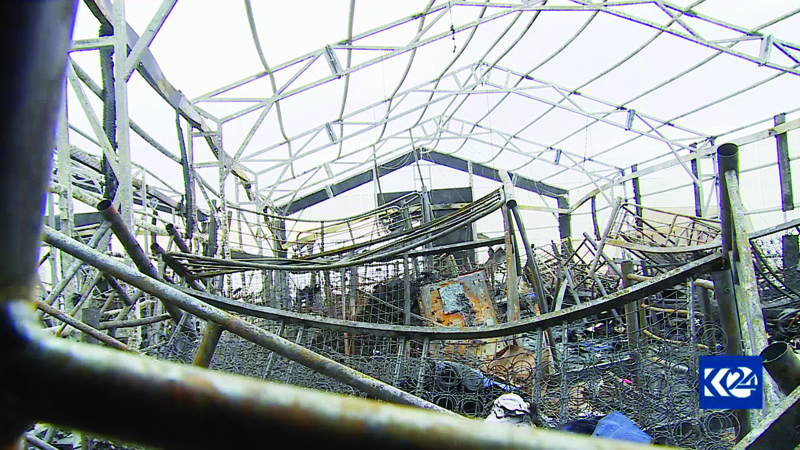 ARBIL: This file image grab taken from Kurdistan 24 TV channel shows damage following a rocket attack two days ago targeting a military complex inside the Arbil airport that hosts foreign troops deployed as part of a US-led coalition. Rockets are again raining down on US targets in Iraq in attacks that, analysts say.-AFP
ARBIL: This file image grab taken from Kurdistan 24 TV channel shows damage following a rocket attack two days ago targeting a military complex inside the Arbil airport that hosts foreign troops deployed as part of a US-led coalition. Rockets are again raining down on US targets in Iraq in attacks that, analysts say.-AFP
BAGHDAD: Renewed rocket attacks on US targets in Iraq show Iran-aligned factions are heaping pressure on the government while Tehran may be seeking leverage over America's new administration, analysts say. Iraq, scarred by years of war and insurgency, has been a strategic battleground for arch-foes the United States and Iran, both allies of Baghdad who remain sharply at odds over Iran's nuclear program.
Analysts and officials in Iraq say the resumption of attacks after four months of relative calm shows that Iran and its Iraqi allies are now abandoning de-escalation and seeking leverage over their rivals. "It seems we're back to last year," a senior US military official in Iraq told AFP, referring to several months in 2020 when rockets rained down on American sites once a week or more. On Monday, two rockets hit near the US embassy in Baghdad, days after a volley hit an airbase further north where a US military contractor is maintaining F-16 fighter-jets purchased from Washington.
US President Joe Biden and Iraqi Prime Minister Mustafa Al-Kadhemi spoke Tuesday by phone about this week's rocket strikes and agreed that those responsible "must be held fully to account", the White House said. Rockets also hit a military complex in the Kurdish region's capital Arbil on February 15, killing a civilian and a foreign contractor working with US-led troops. The conversation came just days after Biden marked one month in office.
"The President affirmed US support for Iraq's sovereignty and independence and commended the Prime Minister's leadership," the White House statement said. "(Biden and Al-Kadhemi) discussed the recent rocket attacks against Iraqi and Coalition personnel and agreed that those responsible for such attacks must be held fully to account," the White House said of the two leaders' call. "Together, they discussed the importance of advancing the Strategic Dialogue between our countries and expanding bilateral cooperation on other key issues."
US State Department spokesman Ned Price had said on Monday that the United States holds Iran responsible for the strikes. "What we will not do is lash out and risk an escalation that plays into the hands of Iran and contributes to their attempts to further destabilize Iraq," Price told reporters.
The incidents were consistent with the dozens of attacks last year, which usually involved a score of 107mm rockets fired from a truck, security officials said. This year, the pro-Iran groups typically blamed for such attacks-including Kataeb Hezbollah and Asaib Ahl Al-Haq-have been quick to condemn the strikes. Few are convinced. "All indications are it's the same style of attacks," said the US military official, speaking on condition of anonymity. "And intelligence shared with us says there are more to come."
'Boosting leverage'
Both local and international dynamics may have prompted the resumed attacks. There are "domestic considerations" as Iraqi armed groups are keen to challenge Kadhemi's assertion that he can rein them in, said Aniseh Bassiri of the Royal United Service Institute. "They want to remind everyone they have not disappeared and show the PM they have not been restrained," she said.
With parliamentary elections scheduled for October, these factions, whose political branches are running at the polls, are flexing their muscles, Bassiri added. But the rockets may also carry a message from Tehran to Washington, which under Biden is offering to revive the Iran nuclear deal which his predecessor Donald Trump abandoned in 2018.
Iran is demanding Washington lift sanctions immediately, while the US wants Iran to move first by returning to all its nuclear commitments. Iran has struck a tough tone this week, restricting some nuclear site inspections and warning it could further step up uranium enrichment. The attack was the third in a week to target Western diplomatic, military or commercial installations in Iraq after months of relative calm.
The attacks are usually claimed by shadowy groups that both Iraqi and US officials say are "smokescreens" for hardline pro-Iran factions inside Iraq. Iraq's al-Kadhemi has pledged to put a halt to rocket attacks but struggled to hold the groups to account, infuriating the US. In October, the US threatened to close its embassy in Baghdad if the attacks did not stop, so hardline groups agreed to an indefinite truce. - AFP
.jpg)



